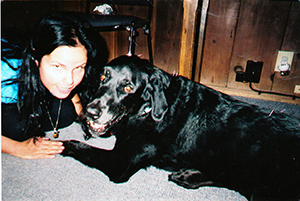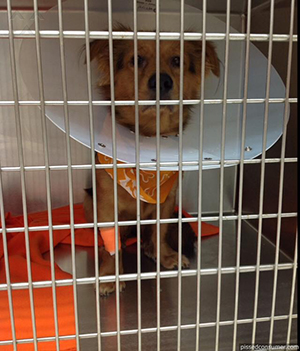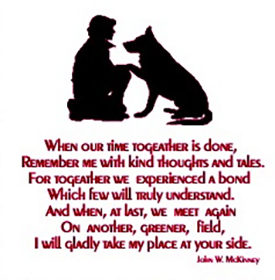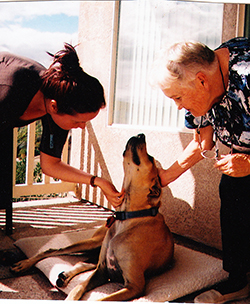This Above All: To Thine Own Pet Be True
By Dr. Reema Sayegh
Although I am fairly certain Polonius meant something else when he spoke similar words in
Act One Scene Three of Shakespeare’s Hamlet, I am also fairly certain animal guardians
everywhere can appreciate this albeit altered sentiment.
Appreciating the sentiment is the easy part. Living the sentiment,
not always so. We as guardians claim to know our pets better than
anyone else, yet I believe most of us would struggle to be true to
them as unconditionally as they are to us. For example, when we
are sick or injured, our pets usually keep a bedside vigil, and
comfort us with quiet company and acceptance of circumstances,
which often means abrupt changes to their cherished routines.
We as humans are not so adaptable. When our pets are happy and
healthy, we tend to take the day-to-day for granted. When we
begin to see some white come into the muzzle, a growing trend
of shorter walks, more time spent sleeping, or a little “hitch”
in our pet’s “gitalong,” we grow uneasy. When our beloved animal
companions become ill or injured, this uneasiness may give way to
downright worry, and a consequent trip to, and possible extended
stay at, the animal hospital.
 Don’t misunderstand me. I think we as our animal's guardians have
a responsibility to seek professional veterinary care whenever the need.
I simply believe we as guardians also have a responsibility to honor our
animal's true natures (not to mention biochemical individuality) and
select treatment protocols accordingly, in a state of focus and clarity,
with their best interests in mind.
Don’t misunderstand me. I think we as our animal's guardians have
a responsibility to seek professional veterinary care whenever the need.
I simply believe we as guardians also have a responsibility to honor our
animal's true natures (not to mention biochemical individuality) and
select treatment protocols accordingly, in a state of focus and clarity,
with their best interests in mind.
For example, three animals may present with the same basic illness or
injury, but, in my opinion, the best treatment and recovery plan depends,
at least in part, upon the true nature of each animal. Let’s say the first
animal is a bouncy, hyper, “friends-with-everyone” puppy who broke his left
hind leg after he wriggled and fell out of a child’s arms. His treatment
and recovery? A simple veterinary repositioning of the leg, plaster casting
and bandaging, and the miracle of a young body’s innate ability to heal
(along with self-removal of said cast with teeth and front paws after being
confined unsupervised during a 60-minute Thanksgiving dinner!). The second
animal is a formerly abused and neglected timid rescued now-eight-year-old
large breed dog who, prior to his forced owner surrender, lengthy physical
and behavioral rehabilitation and eventual re-homing, sustained his broken
leg (and permanent structural and neurological damage) at the hands of a
vicious, ignorant teenager as punishment for chasing chickens on the family’s
farm. (No treatment was sought for an entire month, the poor injured animal
was penned up alone outdoors in unforgiving Utah desert winter conditions,
and there was no available orthopedic treatment in the area, so the pup’s
leg did its best to heal on its own.
 When the dog could no longer bear any weight on the leg, and hobbled
along with his paw held up, he was finally taken to a veterinarian for
treatment. Although the veterinarian gave it her all in her efforts to
repair the leg by cutting a still-visible seven-inch line deep into
the muscle tissue parallel to the femur with the intention of surgical
intervention, upon further inspection and manipulation of the area,
she determined the bone had already formed a callous along the fracture
line and healed in a novel – read: abnormal -- shape, and it was in the
terrified, forlorn, unsocialized, fear-reactive dog’s best interest to
merely stretch the bruised, swollen and contracted muscle as much as
possible, stitch up the leg, wrap it in gauze and Coban, and safely
confiscate and then place the dog with a local rescue organization
until he would be ready for adoption into a loving, permanent home.)
The third animal is a “touch-me-only-if-I-trust-you” giant breed
13-year-old dog with arthritis and degenerative disc disease, whose
leg managed to twist (and cause a tib-fib fracture that required an
internal fixator) during a walk through the grass. Three animals,
three broken hind legs, three very different treatment and recovery scenarios.
When the dog could no longer bear any weight on the leg, and hobbled
along with his paw held up, he was finally taken to a veterinarian for
treatment. Although the veterinarian gave it her all in her efforts to
repair the leg by cutting a still-visible seven-inch line deep into
the muscle tissue parallel to the femur with the intention of surgical
intervention, upon further inspection and manipulation of the area,
she determined the bone had already formed a callous along the fracture
line and healed in a novel – read: abnormal -- shape, and it was in the
terrified, forlorn, unsocialized, fear-reactive dog’s best interest to
merely stretch the bruised, swollen and contracted muscle as much as
possible, stitch up the leg, wrap it in gauze and Coban, and safely
confiscate and then place the dog with a local rescue organization
until he would be ready for adoption into a loving, permanent home.)
The third animal is a “touch-me-only-if-I-trust-you” giant breed
13-year-old dog with arthritis and degenerative disc disease, whose
leg managed to twist (and cause a tib-fib fracture that required an
internal fixator) during a walk through the grass. Three animals,
three broken hind legs, three very different treatment and recovery scenarios.
I dare say this, since I have been (and currently am) fortunate enough to
be the guardian of the animals in every aforementioned example. My experience
with my deceased senior dog Zeus was by far the most challenging, and also by
far the most rewarding. Here is our story.
Zeus was a Great Dane, and Labrador Retriever rescue who spent the first nine years
of his life in the wilds of southern Utah as a companion to an outdoor climbing
guide, who eventually concluded she could no longer meet his growing needs, so I
adopted him. Despite his advanced age, with some urgent dental extractions for
long-standing abscessed teeth, gradual, yet radical, dietary changes and an
incorporation of various holistic modalities, we managed to share a pretty
healthy, incredible, life-changing three and a half years together before
he injured his left hind leg one chilly November night in 2007. No one
(except Zeus) realized how badly the leg was injured until we tried to
continue our walk and my ever stoic Zeus yelped once, and then could not
bear any weight on the leg. He held it up feebly and pleadingly, and
when I went to touch it, it dangled much like a pendulum, to and fro
in my hands. My stomach lurched and my heart sank, as I knew that,
despite Zeus’s seemingly minimal reaction to the injury, it was far
more serious than a simple ankle twist in the tall grass.
So to the multi-specialty 24-hour emergency animal hospital we raced,
Zeus and me in the Animal Ambulance, and my husband and mother following
in the family vehicle. From the time we got him into the ambulance until
we arrived at the hospital, in an effort to keep him from going into shock,
I dosed Zeus every 10 minutes with Rescue Remedy from the Bach Flower Essence
collection, as I came to realize over the course of those three and a half
good years that veterinary homeopathy in general and
flower essences in particular
were at the top of our go-to list for adjunct care, especially during emergencies.
Even the chief of staff at the hospital was impressed by the essences’
effects, as he determined Zeus had not gone into shock, and required approximately
half as much morphine as he originally intended to give him for the pain, based
on what they normally give a dog his size. (In fact, during one of our many
house call visits, this doctor shared with me that he had placed an order for
several bottles of Rescue Remedy, one for each exam room at the facility –
wonderful news during such a dark time!)
After x-rays were taken, the orthopedic surgeon was called in, and informed
us that we were up against some pretty heavy odds. A lengthy, complicated
surgery was required to mend Zeus’s injury, and due to his age and the amount
of time required, he had a 50-50 chance of surviving surgery. The surgeon
also explained the leg would not heal if we simply casted or bandaged it.
I was almost paralyzed with fear – no, make that dread – yet I knew it wouldn’t
be fair to the larger-than-life, magnificent Zeus to just leave his leg in this
mangled condition and call it a night.
Four sleepless hours later, the phone in our hotel room two miles away
from the animal hospital rang, and I braced myself for the news. True to
his nature and name, Zeus had survived the surgery and was in the ICU.
We were told we could see him soon, which turned out to be when we stormed
into the hospital unannounced after another three-hour wait with no further calls.
 Related:
Animal Trauma and Injuries: How I Use Home Remedies to Heal my Pets
Related:
Animal Trauma and Injuries: How I Use Home Remedies to Heal my Pets
Somehow, the Universe again had our backs, as the anesthesiologist was at
the front desk when we arrived, looking something like what can only be described
as feral humans, and could not help but overhear my loud, assertive insistence
that we see my dog. Now.
He managed to ignore the scene I was causing, and graciously and quickly
ushered all three of us into the recovery area, where I found my beloved friend
propped up on numerous blankets and pillows in the far corner of the room,
unfortunately next to the room where the deceased pets were housed. Apparently,
despite its bevy of state-of-the-art staff, procedures and equipment, the facility
did not feature a cage that could accommodate my boy who came up to my ribcage with
all four on the floor, and could see my six-foot-tall husband’s bald spot when we
allowed Zeus to greet us in preferred Dane fashion. He looked so old, weak and
drugged. He had tubes and bags and poles in and all around him, and I could hear
him whining from across the room. I was beginning to doubt my choice, when Zeus
noticed us, and circumstances be damned, began to wag his tail and struggle to
get to his feet to greet his human family.
Tears poured from my eyes as we all rushed over to Zeus, and I managed to hold
down the mighty beast as I sprawled out on the floor beside him, covering him with hugs and kisses.
When the love fest was over, I began to notice the catheter bag was full of
red-tinged urine, and some was backing up into the tube. Before our anesthesiologist
escort could get away, I tugged on his scrubs and brought the matter to his attention.
After what felt like forever but had really only been three of the longest minutes of
my life, a technician ambled over, nodded a cursory greeting, and began to attempt to
change the bag. Before anyone knew what was happening, Zeus rose up on his front legs,
growled loudly and twisted in a furious attempt to bite the man. Everyone was stunned.
I had seen Zeus snarl at his veterinary acupuncturist when a needle or two or five caused
him pain, but never before had he done anything like this.
The nimble and quick technician escaped unharmed, but I intuited Zeus’s reaction
did not bode well for any hope of future, more attentive care. Never ignore your gut!
Five hours later, I was awakened by a distressing call from the chief of staff, whom I
am convinced is an angel among us. I had refused to leave for another two hours after
the incident, and in that time I had successfully hand-fed Zeus his supplied homemade
fare and seen to it that he had been re-positioned, medicated, and sufficiently –
if not reluctantly – attended to before he lapsed into slumber, and I surrendered
to utter exhaustion and returned to the hotel for a nap.
The story I heard was that Zeus had awakened, realized we had left, and again
became “quite combative” toward everyone who approached him, including the gentle,
loving, patient, empathetic, yet now very concerned, chief of staff. He warned me
that if Zeus could not calm down, he would have to be muzzled and tethered (to what?
I wondered in bewilderment and growing panic, as I remembered he was being warehoused
in the corner of the room).
Bear in mind, this was a dog who, in what now feels like the blink of an eye,
managed to endear himself to everyone, even the most reticent of non-animal folks,
in our uptight, conservative, overwhelmingly judgmental formerly little-dog-preferred
gated community. He became everyone’s friend, and brought the residents together
whenever we walked through the neighborhood. Zeus had dozens of common area play
dates (his all-time favorites with the 10-year-old 200-pound Great Dane named Marble
and the almost-blind 13-year-old toy poodle named Bubba) and doggie birthday parties,
and loved to visit the elderly, wheelchair-bound widow who kept him in tennis balls.
He first stood, and later lay, patiently by my side when children unabashedly played
with his ears, showered him with clumsy hugs and kisses, and even tried to ride him as
their parents watched with ear-to-ear grins.
 So you can imagine my shock and disbelief when I heard the doctor’s tale of events.
I told the doctor I would be right back to discuss matters, hung up the phone and scrambled
down four flights of stairs to the hotel lobby, where angels intervened once more.
I literally collided with one of the hospital’s elite veterinary specialists who had
flown in from Tennessee to perform gastrointestinal surgery on one of the patients,
and who has just returning to his home away from home for a rest. I had seen him
earlier in the recovery area, and therefore recognized him as we collided. Before I
could restrain myself, I was bending this man’s ear with the story, and he calmly
drew in, then out, a deep, long breath and said, “If it were my dog, I would sign
him out AMA. Just don’t tell them where you got that idea.” I heard teeny tiny
bells ringing and saw little fluttering rainbow-colored birds fly around his head,
as it dawned on me Zeus just might be getting his get-out-of-jail-free card.
(Actually, it ended up being a $6 thousand-plus get-out-of-jail card, but that’s
the best 6 grand we ever spent!)
So you can imagine my shock and disbelief when I heard the doctor’s tale of events.
I told the doctor I would be right back to discuss matters, hung up the phone and scrambled
down four flights of stairs to the hotel lobby, where angels intervened once more.
I literally collided with one of the hospital’s elite veterinary specialists who had
flown in from Tennessee to perform gastrointestinal surgery on one of the patients,
and who has just returning to his home away from home for a rest. I had seen him
earlier in the recovery area, and therefore recognized him as we collided. Before I
could restrain myself, I was bending this man’s ear with the story, and he calmly
drew in, then out, a deep, long breath and said, “If it were my dog, I would sign
him out AMA. Just don’t tell them where you got that idea.” I heard teeny tiny
bells ringing and saw little fluttering rainbow-colored birds fly around his head,
as it dawned on me Zeus just might be getting his get-out-of-jail-free card.
(Actually, it ended up being a $6 thousand-plus get-out-of-jail card, but that’s
the best 6 grand we ever spent!)
Tubes and wires disconnected, dirty bedding piled in a messy heap on the cold,
gray hospital floor, Zeus was loaded onto our newly purchased stretcher with mommy
glued to the side of his head in effort to avoid further “combative” behavior.
The whole scene was so morosely surreal, I felt like a pallbearer helping to carry
a cherished, albeit very heavy, relative to his hearse. Only this was my Jeep, and
we were on our way home.
Zeus fought the good fight for seven more months, and the chief of staff agreed
to privately arranged twice weekly home visits for the first few nightmarish weeks
as we all did our utmost to get Zeus up and walking again.
What’s that phrase? Life happens when you are busy making other plans? Something
like that. Anyway, Zeus never walked again. His body began to reject the implanted
apparatus, and he developed what the dermatologist called the worst case of sarcoptic
mange she had ever treated. She deduced he had contracted it from the hospital bedding,
and it had incubated quietly and fiercely underneath the layers of non-breathable
bandage material before Zeus developed secondary bacterial infections body-wide.
Oh yeah, he managed to acquire nasal mites as well. (I am scratching myself as
I write this, from the mere recounting of the struggle.)
Days, then weeks, passed as we worked through range of motion exercises and daily
massages to keep everything moving. We took turns sleeping on the couch above Zeus
(the most central, open area of the house), and rotated shifts spent toileting, feeding,
medicating, and entertaining this former star quarterback of the canine world.
Much to the disgust of Zeus’s two feline housemates, when it was too rainy and
then too warm to stay in the community park for hours on end, our small living
room welcomed scores of visiting play pals and their people, who came first to
motivate, then to comfort, and finally to bid last farewells.
Upon reflection, we unknowingly provided hospice care to a dying animal.
Some folks confuse animal hospice with at-home veterinary euthanasia services.
This is not the case at all! Much like human hospice, animal hospice is a growing
sub-specialty that provides palliative care and services for animal and guardian alike,
in attempts to allow pets and their people to usher in the inevitable with grace and
dignity, in priceless comforts of home’s environs.
Three nights before Zeus died, I was sitting beside him going through his enormous
toy collection. I had sensed we were nearing the end of our journey, and wanted to gift
Zeus’s BFFs with some favorite possessions. As I reached for a fuzzy orange basketball,
I heard a feeble play growl and felt an enormous paw pin down my hand as Zeus worked to
roll the ball toward his mouth. I instantly snapped out of my grieving fugue state, and
spent the next half hour playing our new version of fetch with my boy. We fell asleep
together on the floor, me with my hand on Zeus, Zeus with his paw on the ball. That
little ball accompanied Zeus throughout the next day’s 4-year adoption anniversary party.
We stowed it in the pocket of his customized harness when he devoured two hot dogs and
some frozen yogurt, welcomed a dozen canine party guests, ate some doggie cake, and
soaked up the early June California sun.
That ball went with us to the veterinary acupuncturist the following day, Zeus’s last
on Earth, as he crashed and we rushed him in for an assessment. We spent five hours sitting
in a large cage with Zeus as he received IV fluids, some homeopathic remedies and intermittent
monitoring. At the end of the day, we took Zeus home. To die. He was no longer wanting to
eat or drink, and he could barely raise his head.
 When
we got home, the sun was almost setting as we went out to the park so Zeus could say
goodbye to a beloved trio of his special needs canine friends (all of whom belonged to the
same amazingly compassionate guardian) -- one who suffered from intermittent syncopal episodes
due to a rare cardiac condition, one in a wheelchair as a result of degenerative myelopathy,
and one uber-reactive formerly stray rescue who liked to make goo-goo eyes at my boy. Three
humans and four dogs sat together in communal silence and watched the sun set. Oh, what a
beautiful memory. No words were needed, as we watched our dogs pile together in a way that
made us all wonder where one animal ended and another began.
When
we got home, the sun was almost setting as we went out to the park so Zeus could say
goodbye to a beloved trio of his special needs canine friends (all of whom belonged to the
same amazingly compassionate guardian) -- one who suffered from intermittent syncopal episodes
due to a rare cardiac condition, one in a wheelchair as a result of degenerative myelopathy,
and one uber-reactive formerly stray rescue who liked to make goo-goo eyes at my boy. Three
humans and four dogs sat together in communal silence and watched the sun set. Oh, what a
beautiful memory. No words were needed, as we watched our dogs pile together in a way that
made us all wonder where one animal ended and another began.
After they left, we returned home in the dark for a quiet night as a little family.
My husband left the room in tears when I held Zeus’s head in my lap, looked him in the
eyes, and told him how much I adored him. I gave him permission to leave us, and
continue his journey into the Great Unknown. I kissed him goodnight and my husband
took a final turn on the couch.
The next morning, I awakened to a sound I would very much like to, but doubt I can
ever, forget. My husband was screaming Zeus’s name through choked tears of grief.
Even though I was two rooms away, I knew what I would find. Our beloved Zeus was dead.
Two hours later, we delivered Zeus’s body to the pet cemetery, where we made arrangements
for private cremation. We held a park side memorial service for him, and over 20 people and
their pets attended. One friend gave us a homemade plaster garden paver with Zeus’s name on
it, and it flanks our front porch to this day.
Although it’s probably obvious that I still desperately miss Zeus, I have no regrets.
I believe his true nature was honored, and even though the last seven months were incredibly
difficult, I knew my dog, and as long as I saw that fire in his eyes, I never stopped trying.
Neither did he.
We euthanized my childhood dog, Tumbleweed. You know, the one who chewed off his own leg
cast about 40 Thanksgivings ago. He lived to the ripe old age of 14 before advanced (yet
undetected) gastrointestinal cancer got the best of him. As he pushed the lethal contents
of the syringe into my dog’s IV line, Tumbleweed’s vet looked my sobbing mother in the eye
and said, “We are kinder to our animals than we are to people.” In that circumstance, I buy that.
 Dakota, the former farm dog-turned-suburban warrior, had better not be planning to go
anywhere anytime soon. Tumbleweed was a buddy. Zeus was a soul mate. Dakota is a
four-legged child. This living, breathing study in contrast is both incredibly loving
and deeply cautious. He can be on his back in complete, blissful repose and surrender
one minute, and bolting to the front window to bellow the possible approach of his
nemesis the UPS man the next.
Dakota, the former farm dog-turned-suburban warrior, had better not be planning to go
anywhere anytime soon. Tumbleweed was a buddy. Zeus was a soul mate. Dakota is a
four-legged child. This living, breathing study in contrast is both incredibly loving
and deeply cautious. He can be on his back in complete, blissful repose and surrender
one minute, and bolting to the front window to bellow the possible approach of his
nemesis the UPS man the next.
I don’t know when or how this dog will spend his final moments. I just know I must be
strong, and do my absolute best to allow this animal with whom I share heart and home to
live out his life his way, sometimes with awkwardness, sometimes with gut-busting humor,
and always with unbridled authenticity.
 About the author:
Dr. Reema Sayegh has a Ph.D. in Holistic Nutrition and Doctor of Naturopathy
degree, and has enjoyed an extensive career in the integrative wellness field.
In 2004, Dr. Reema rescued a nine-year-old Great Dane mix named Zeus, who inspired
her to “shift gears.” She has since become a Reiki master teacher, published
author, public speaker, animal welfare advocate, and currently works as a
certified holistic pet consultant, working in tandem with veterinarians and
their clients to provide companion animals with adjunct natural wellness
modalities, and specialty geriatric and hospice care. Dr. Reema lives
in southern California with her husband and the love of their lives, a
spirited canine teacher, healer, and fun-loving goofball named Dakota.
To reach Dr. Reema, you may email her at drreema4pets@yahoo.com.
About the author:
Dr. Reema Sayegh has a Ph.D. in Holistic Nutrition and Doctor of Naturopathy
degree, and has enjoyed an extensive career in the integrative wellness field.
In 2004, Dr. Reema rescued a nine-year-old Great Dane mix named Zeus, who inspired
her to “shift gears.” She has since become a Reiki master teacher, published
author, public speaker, animal welfare advocate, and currently works as a
certified holistic pet consultant, working in tandem with veterinarians and
their clients to provide companion animals with adjunct natural wellness
modalities, and specialty geriatric and hospice care. Dr. Reema lives
in southern California with her husband and the love of their lives, a
spirited canine teacher, healer, and fun-loving goofball named Dakota.
To reach Dr. Reema, you may email her at drreema4pets@yahoo.com.